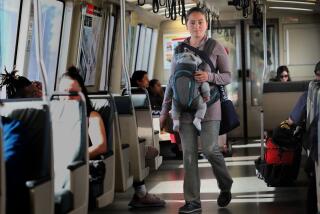COUNTYWIDE : Transit Plans for Disabled Approved
- Share via
Seeking to comply with a new federal law, county transportation officials on Monday approved plans to expand transit service for the disabled.
But there’s a catch: Tougher eligibility requirements may force 150 to 200 people who use on-demand, curb-to-curb Dial-A-Ride vans to use the county’s regular, fixed-route bus system.
Also, free fares for the blind may be eliminated because the new Americans with Disabilities Act, adopted by Congress last year, prohibits fare discrimination among passengers with different disabilities.
Under the Orange County Transportation Authority plan--developed after three public workshops--Dial-A-Ride subscription service for regular commutes would be eliminated by February, 1993. It would be replaced by service, reserved a day ahead, exclusively for the physically disabled, based on criteria that are still being studied.
Frequency of service would be increased dramatically, however, because the new law requires that service for the disabled match that afforded the general public.
About 150 to 200 people will find it difficult to make the change because of their individual problems, OCTA officials said. Some disabled people who can get to a bus stop will have to take a regular OCTD bus to jobs on weekdays. However, on weekends they could resort to the special, door-to-door service for the disabled.
“There’s a lot of half-of-one and half-of-the-other,” said John Catoe, who supervises OCTD transit services.
A dozen people, mostly in wheelchairs, testified at Monday’s public hearing held by the OCTA, with several voicing fears that they will lose existing Dial-A-Ride service even in cases where a regular bus stop is too far from their homes to do much good.
Most of the comments were similar to those of lead-off witness Stephanie Lipke of Fullerton. “This is very important to us,” Lipke said. “Transportation gives us a quality of life that otherwise we wouldn’t have.”
She said OCTA’s plans are excellent except for the lack of quick service during emergencies. “I know it costs money,” Lipke added, “but I’m willing to pay for same-day service.”
John Catoe, service director for the Orange County Transit District, said the agency would work with users to refine proposals but that the system was “never intended” to handle emergencies.
Several witnesses worried that the anticipated fares--as much as $2--are more than double what some disabled and elderly passengers now pay.
Mallory Vega of Orange, representing the Orange County Adult Day Care Coalition, said such fares would “double our transportation costs and wipe out our transportation budgets.”
The choice left for some will be to quit their jobs for lack of access or move into a nursing home, Vega said.
Representatives from several Head Start preschool programs warned that they will continue to need transit services for the poor to supplement regular bus service since many families have no other means of transportation.
OCTA officials said they would work with such groups to find solutions.
More to Read
Sign up for Essential California
The most important California stories and recommendations in your inbox every morning.
You may occasionally receive promotional content from the Los Angeles Times.










